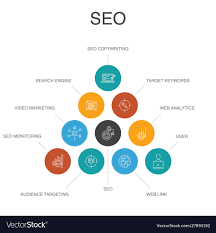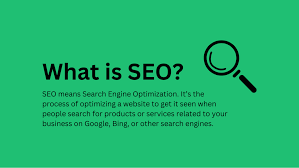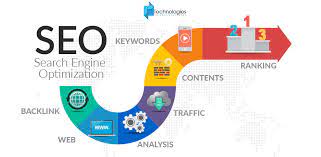Unlocking Essential SEO Concepts for Digital Success
The Fundamentals of SEO Concepts
Search Engine Optimization (SEO) is a crucial component of digital marketing that focuses on improving a website’s visibility and ranking on search engine results pages. Understanding key SEO concepts is essential for businesses looking to enhance their online presence and attract more organic traffic. Let’s delve into some fundamental SEO concepts:
Keywords and Keyphrases
Keywords and keyphrases are the terms that users enter into search engines when looking for information. Effective keyword research helps identify relevant terms that can drive targeted traffic to a website. Incorporating these keywords strategically in website content, meta tags, and headings can improve search engine rankings.
On-Page SEO
On-page SEO involves optimizing individual web pages to improve their visibility and relevance to search engines. This includes creating high-quality content, optimizing meta tags, headers, and images, as well as ensuring proper URL structures and internal linking. On-page SEO practices aim to provide valuable information to users while making it easier for search engines to crawl and index the content.
Off-Page SEO
Off-page SEO refers to activities conducted outside of the website to improve its authority and reputation. This includes building backlinks from reputable websites, engaging in social media marketing, and enhancing online presence through directory listings and influencer collaborations. Off-page SEO signals help search engines assess the credibility and relevance of a website.
Technical SEO
Technical SEO focuses on optimizing the technical aspects of a website to enhance its crawling and indexing by search engines. This includes improving site speed, mobile-friendliness, fixing broken links, implementing structured data markup, and ensuring secure HTTPS protocols. Technical SEO ensures that search engines can efficiently access and understand a website’s content.
User Experience (UX)
User experience plays a vital role in SEO as search engines prioritize websites that offer a seamless browsing experience for visitors. Factors such as page load speed, mobile responsiveness, intuitive navigation, engaging content layout, and clear calls-to-action contribute to improved user experience. By prioritizing UX design principles, websites can attract more visitors and retain them for longer durations.
Measuring Success with Analytics
Analyzing key performance indicators (KPIs) through tools like Google Analytics helps track the effectiveness of SEO strategies. Metrics such as organic traffic growth, keyword rankings, bounce rates, conversion rates, and click-through rates provide insights into the performance of an SEO campaign. By monitoring analytics data regularly, businesses can make informed decisions to refine their SEO efforts for better results.
Key Benefits of SEO: Boosting Visibility, Credibility, and Sustainable Growth
- Enhances online visibility
- Increases website traffic organically
- Improves search engine rankings
- Boosts brand credibility and trust
- Targets specific audience segments effectively
- Cost-effective compared to paid advertising
- Long-term sustainable results
- Adaptable to evolving search engine algorithms
Understanding the Challenges of SEO: Patience, Competition, and Constant Adaptation
- SEO results may take time to show, requiring patience and ongoing efforts.
- Constant algorithm updates by search engines can impact SEO strategies and rankings.
- Competitive keywords may be difficult to rank for, especially in saturated industries.
- Poorly executed SEO tactics can lead to penalties from search engines, harming website visibility.
- Effective SEO requires continuous monitoring and adaptation to stay ahead of competitors.
- SEO success is not guaranteed and depends on various factors such as content quality, backlinks, and user experience.
Enhances online visibility
Improving online visibility is a key advantage of mastering SEO concepts. By implementing effective search engine optimization strategies, businesses can enhance their website’s visibility on search engine results pages, making it easier for potential customers to discover their products or services online. Increased online visibility not only drives more organic traffic to the website but also boosts brand awareness and credibility in the digital landscape. By focusing on SEO concepts that enhance online visibility, businesses can position themselves ahead of competitors and reach a wider audience effectively.
Increases website traffic organically
By implementing SEO concepts effectively, businesses can experience a significant pro in the form of increased website traffic organically. Through strategic keyword targeting, quality content creation, and technical optimizations, SEO enhances a website’s visibility on search engine results pages, attracting relevant users actively searching for products or services. This organic traffic not only boosts website visits but also improves user engagement and conversion rates, ultimately leading to sustainable growth and success for the business in the digital landscape.
Improves search engine rankings
One of the key advantages of mastering SEO concepts is its ability to enhance search engine rankings. By implementing effective SEO strategies such as keyword optimization, quality content creation, and building reputable backlinks, websites can improve their visibility on search engine results pages. Higher search engine rankings not only increase organic traffic but also establish credibility and trust among users, ultimately leading to greater online exposure and potential for business growth.
Boosts brand credibility and trust
One significant advantage of implementing SEO concepts is that it boosts brand credibility and trust. By appearing higher in search engine results pages, businesses signal to users that they are reputable and relevant within their industry. This increased visibility not only enhances brand awareness but also instils trust among potential customers, leading to higher engagement and conversion rates. Establishing a strong online presence through effective SEO strategies can ultimately solidify a brand’s credibility and foster long-term relationships with its target audience.
Targets specific audience segments effectively
One significant advantage of SEO concepts is their ability to target specific audience segments effectively. By conducting thorough keyword research and implementing tailored strategies, businesses can reach their desired demographic with precision. This targeted approach ensures that the content and messaging resonate with the right audience, leading to increased engagement, higher conversion rates, and ultimately, improved ROI. SEO allows businesses to connect with potential customers who are actively searching for products or services related to their offerings, making it a powerful tool for driving qualified traffic and generating valuable leads.
Cost-effective compared to paid advertising
One significant advantage of SEO concepts is their cost-effectiveness when compared to paid advertising. By strategically implementing SEO strategies such as keyword optimization, content creation, and link building, businesses can improve their online visibility and attract organic traffic without incurring significant advertising costs. Unlike paid ads that require ongoing investment, SEO efforts can yield long-term benefits and sustainable results, making it a cost-efficient approach for businesses looking to enhance their digital presence and reach a wider audience.
Long-term sustainable results
One significant advantage of SEO concepts is the ability to achieve long-term sustainable results. By implementing effective SEO strategies such as quality content creation, keyword optimization, and link building, businesses can improve their online visibility and organic traffic over time. Unlike short-term marketing tactics, SEO focuses on building a strong foundation that can yield continuous benefits in the long run. This approach not only helps businesses maintain consistent search engine rankings but also establishes credibility and trust with both users and search engines for sustained success.
Adaptable to evolving search engine algorithms
One significant advantage of SEO concepts is their adaptability to evolving search engine algorithms. As search engines continually update their algorithms to enhance user experience and deliver more relevant results, staying abreast of these changes is crucial for maintaining a strong online presence. By incorporating flexible SEO strategies that can adjust to algorithm updates, businesses can ensure that their websites remain visible and competitive in search engine rankings. This adaptability allows businesses to stay ahead of the curve and effectively reach their target audience amidst the ever-changing digital landscape.
SEO results may take time to show, requiring patience and ongoing efforts.
Achieving tangible results through SEO strategies can be a gradual process that demands patience and consistent effort. It is essential to understand that search engine optimisation is a long-term investment, and the impact may not be immediate. Building a strong online presence and improving search engine rankings require continuous refinement of SEO tactics, content creation, and monitoring of performance metrics. By staying committed to the process and adapting to evolving algorithms, businesses can ultimately reap the rewards of improved visibility and organic traffic over time.
Constant algorithm updates by search engines can impact SEO strategies and rankings.
The ever-evolving nature of search engine algorithms poses a significant challenge for SEO practitioners. Constant algorithm updates by search engines can disrupt established SEO strategies and impact website rankings. What may have worked effectively in the past could suddenly become less effective or even penalised due to algorithm changes. Adapting to these updates requires staying informed about the latest trends and adjusting SEO tactics accordingly to maintain or improve search engine rankings.
Competitive keywords may be difficult to rank for, especially in saturated industries.
Competitive keywords pose a significant challenge in the realm of SEO, particularly within industries that are already densely populated with established players. Trying to rank for these highly competitive keywords can be an uphill battle, as larger companies with substantial resources often dominate search engine results. In saturated industries, smaller businesses may find it challenging to compete for visibility and organic traffic, requiring them to adopt strategic long-term SEO approaches and focus on niche keywords to carve out their own space in the digital landscape.
Poorly executed SEO tactics can lead to penalties from search engines, harming website visibility.
Poorly executed SEO tactics can have detrimental consequences for a website’s visibility and online presence. Search engines like Google are quick to penalise websites that engage in unethical or spammy SEO practices. These penalties can result in a significant drop in search engine rankings, making it harder for users to find the website organically. It is essential for businesses to adhere to best SEO practices and avoid shortcuts that could ultimately harm their online reputation and visibility.
Effective SEO requires continuous monitoring and adaptation to stay ahead of competitors.
To succeed in the ever-evolving digital landscape, effective SEO demands ongoing monitoring and adaptation to remain competitive. Search engine algorithms frequently change, and competitors constantly refine their strategies. By staying vigilant and adapting to emerging trends, businesses can maintain their visibility and outperform competitors in search engine rankings. Continuous monitoring allows for timely adjustments, ensuring that SEO efforts align with current best practices and provide a sustainable advantage in the online market.
SEO success is not guaranteed and depends on various factors such as content quality, backlinks, and user experience.
Achieving success in SEO is not a guaranteed outcome and is contingent upon a multitude of factors. The quality of content, the strength of backlinks, and the overall user experience play pivotal roles in determining the effectiveness of an SEO strategy. Without compelling content that resonates with the target audience, authoritative backlinks that establish credibility, and a seamless user experience that keeps visitors engaged, achieving desired results in search engine rankings can be challenging. It is essential for businesses to focus on these key elements to maximise their chances of success in the competitive digital landscape.




